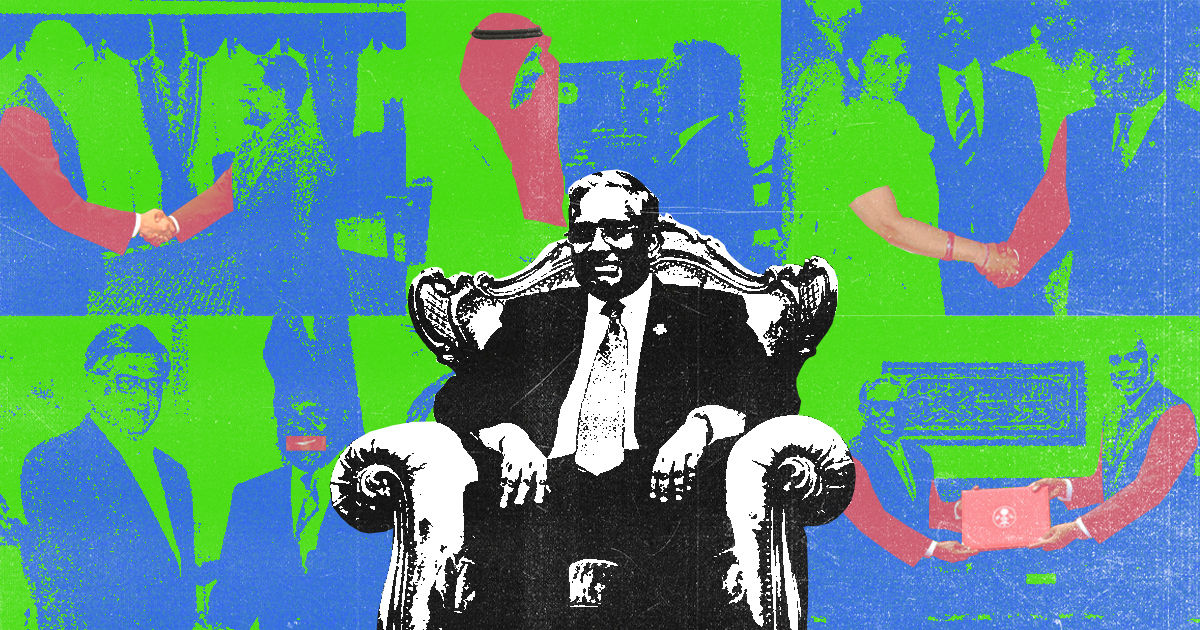Ex-president deployed on Maldives diplomatic rescue mission as foreign aid dries up
Only four percent of projected aid has been secured.

Artwork: Dosain
04 Jun 2025, 15:42
With 96 percent of international aid expected this year failing to materialise, the Maldives government has enlisted former president Dr Mohamed Waheed to salvage critical diplomatic relationships in the face of a looming debt crisis.
Waheed’s appointment as the president’s special envoy last week – “to utilise his extensive experience to advance the Maldives’ diplomatic interests” – followed mounting frustration with the foreign ministry, a senior government official told the Maldives Independent.
“There is a feeling within the President’s Office about whether enough work has been done to strengthen diplomatic ties and leverage established partnerships to secure the projected grant aid,” the official said.
Grants of MVR 2.5 billion (US$ 162 million) were projected in the 2025 budget, but only US$ 6.5 million has been secured so far, according to the latest fiscal update, representing a significant fall from the US$ 15 million collected during the same period in 2024.
Last month, credit ratings agency Moody's maintained a negative outlook for the Maldives, citing depleted foreign currency reserves and "limited financing options in light of upcoming external debt maturities." After US$ 700 million in external payments this year, debt service obligation rises to a whopping US$ 1.07 billion in 2026, eclipsing gross international reserves that stood at US$ 708 million in January.
The foreign ministry’s inability to “sell ideas” to donors was a key reason for the failure to secure budgetary support, according to senior foreign and finance policy officials.
“It is not just about convincing partners. While that can be seen as a problem, globally, the impact of new US policy has had a huge domino effect on the donor ecosystem, with new strategies being formed by donor nations to deal with the fallout. That has made things harder than usual,” a foreign ministry source explained to the Maldives Independent.
Waheed’s role was intended to streamline efforts to secure aid and develop economic partnerships.
“The other thing that we have been discussing is that the senior political team and at the foreign ministry may be lacking in experience in leading discussions and influencing international counterparts. This is one of the reasons that a new envoy has been appointed,” a senior President’s Office official told the Maldives Independent.
There was a lack of confidence in top diplomats in “one or two important donor countries.” according to the official.
Diplomatic fixer
The inexperience of top diplomats has been consequential. A minister’s 45-minute presentation to heads of a financial institution in an Arab country was so unclear that “neither what the Maldives needed nor the benefits that country would gain from providing assistance were apparent,” leaving the Maldivian ambassador who was present at the meeting feeling embarrassed by the confusion, a foreign ministry official told Sun earlier this year.
The missteps began early in President Dr Mohamed Muizzu’s administration.
The Saudi Arabian representative who attended Muizzu’s inauguration in November 2023 was treated disrespectfully. The President’s Office then prematurely announced dates for Muizzu’s visit to Saudi Arabia as his first overseas trip, which was promptly canceled. Instead he travelled to Türkiye – Saudi Arabia’s regional rival – and praised Turkish President Erdogan as the “leader” of the global Islamic community, an affront to the kingdom, traditionally one of the most generous sources of aid to the Maldives.
Ahead of his belated visit to Jeddah, Muizzu later described Saudi Arabia as the leader of the Islamic world, and repeated the assertion at an OIC conference in Riyadh.
Diplomatic ties with India – arguably the country’s most important bilateral relationship – meanwhile soured after Muizzu described the giant neighbour as a “bully” and his top aides insulted Prime Minister Narendra Modi, triggering a diplomatic row and a tourism boycott campaign. The administration has since repaired the relationship but the legacy of the ‘India Out’ campaign continues to cast a shadow.
China was expected to be the new administration’s closest partner based on the ruling party’s productive ties with Beijing when it was last in power. But Muizzu’s first foreign minister Moosa Zameer reportedly lacked experience with Chinese diplomatic protocol, leading to delays in implementing agreements penned during the president’s state visit to China in January 2024.
In contrast to the rapid mobilisation of Chinese-funded infrastructure projects during former president Abdulla Yameen’s administration, projects such as the redevelopment of Malé’s roads, a 100-bed hospital in Villimalé, and an Addu powerhouse have yet to begin.
Former president Waheed’s deployment came after the replacement of Zameer – who was transferred to the finance ministry – with former health minister Dr Abdulla Khaleel in September last year, fuelling speculation about the president’s reluctance to appoint a third foreign minister in less than two years.
Muizzu also appears to have set aside previous rivalry with Waheed for the opposition’s presidential ticket, praising him as a “seasoned diplomat.”
Following the appointment, Waheed’s son Jeffrey Salim Waheed characterised his father's decision to accept the post as placing “the needs of the nation first.”
“He served as Special Envoy under President Yameen, facilitated meetings and budgetary support under President Solih, and is offering that same measure of support to President Muizz,” he said.
Discussion
No comments yet. Be the first to share your thoughts!
No comments yet. Be the first to join the conversation!
Join the Conversation
Sign in to share your thoughts under an alias and take part in the discussion. Independent journalism thrives on open, respectful debate — your voice matters.
Support independent journalism
Related Stories

"You are my saviour": Maldives ex-president Waheed to Jeffrey Epstein
16 Nov 2025, 15:32

"Act our size": Dr Shaheed on principled pragmatism for the Maldives in a multipolar world
01 Apr 2025, 17:02

Russian ambassador's clash with ex-Maldives presidents lays bare geopolitical tightrope
27 Mar 2025, 23:41

